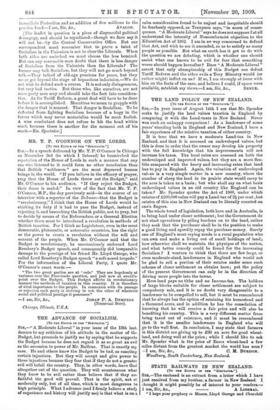THE LAND POLICY OF NEW ZEALAND.
ITO TIM EDITOR OF THE " EIPELTAT01.1
Sur,—In your issue of August 14th I see that Mr. Spender seeks to justify the land values taxation in England by comparing it with the Land-taxes in New Zealand. Never was such an unhappy comparison ! As a landowner of some years' standing both in England and New Zealand, I have a fair experience of the relative taxation of either country.
It is true that we have a moderate Land-tax in New Zealand, and that it is assessed on undeveloped values, but this is done in order that the owner may develop his property with the full knowledge that his improvements will not increase his taxes. The local rates are assessed on both the undeveloped and improved values, but they are a mere flea- bite compared with the heavy and increasing rates that land has to pay in England. Again, the valuation of undeveloped values is a very simple matter in a new country, where the number of sheep the land in its prairie state would carry to the acre is taken as a basis ; but who shall say on what basis undeveloped values in an old country like England can be taken ? Mr. Spender quotes the Act of 1908, under which estates of i'200,000 value will pay a Land-tax of 21 per cent ,but estates of this size in New Zealand can be literally counted on one's fingers.
The whole trend of legislation, bothhere and in Australia, is to bring land under closer settlement; but the Government do not start operations by piling burdens on to the land, rather they seek that the purchaser shall be in the position to make a good living and speedily repay the purchase-money. Surely one of England's most crying needs is a rural population who can own and make a living out of small holdings of land; how otherwise shall we maintain the physique of the nation, and what better remedy could be found for the increasing Socialism ? I venture to think that there are few large, or even moderate-sized, landowners in England who would not be glad to sell a portion of their estates under some such scheme of closer settlement as obtains here ; yet the policy of the present Government can only be in the direction of driving more people into the towns.
Here land pays no tithe and no Income-tax. The holders of large blocks suitable for closer settlement are subject to compulsory sale, and it is no doubt very disagreeable to a landowner to be compelled to sell, but it must be remembered that he always has the option of retaining his homestead and a thousand acres, and in addition he has the consolation of knowing that he will receive a fair price and will also be benefiting his country. This is a very different matter from being taxed out of existence, and it must be remembered that it is the smaller landowners in England who will go to the wall first. In conclusion, I may state that farmers in this district are giving up to 230 an acre for good wheat- land, and doing well at the price; while I should like to ask Mr. Spender what is the price of Essex wheat-land a few miles distant from the greatest market the world has seen ?
























































 Previous page
Previous page